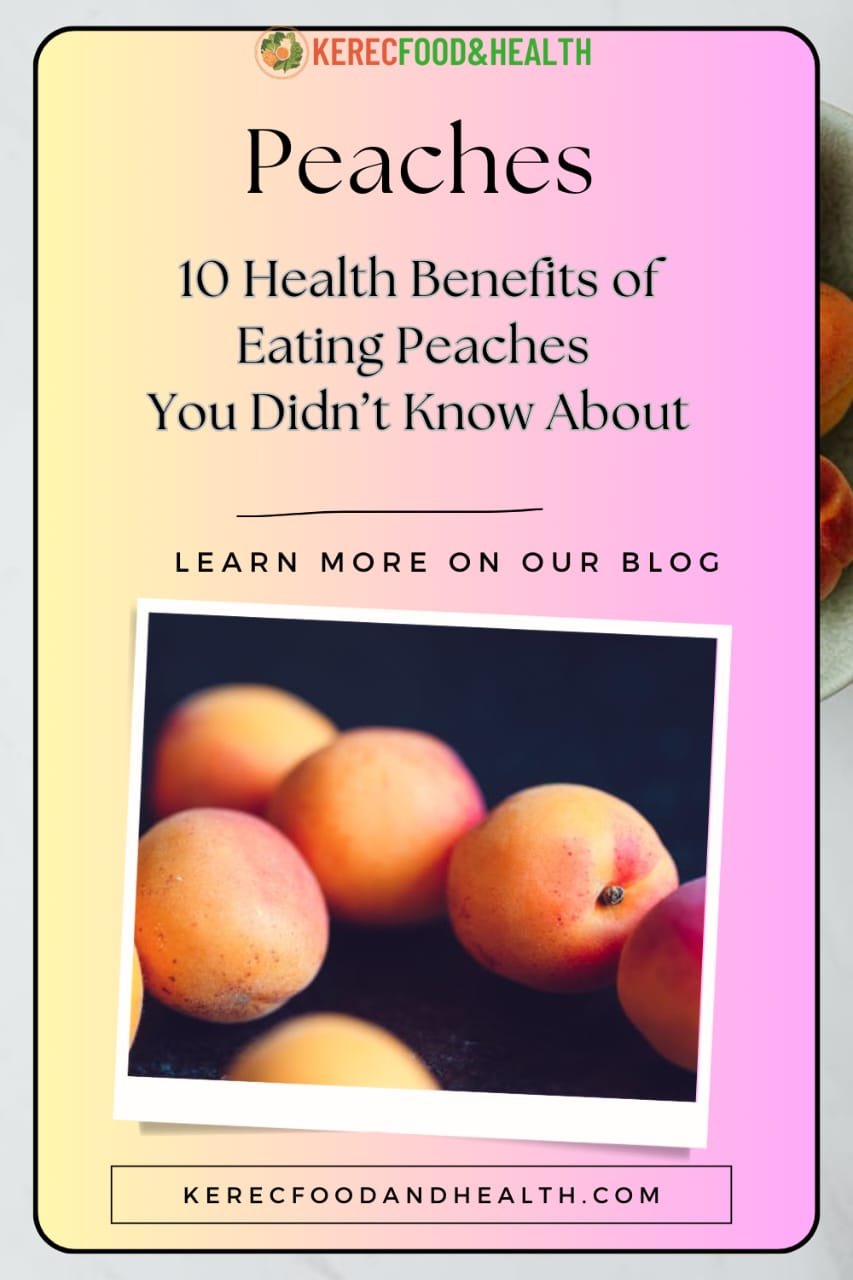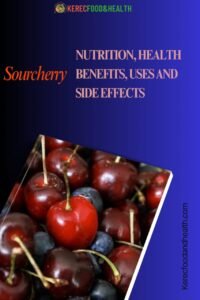Peaches are more than just a sweet, juicy summer treat—they’re a powerhouse of health benefits! You might know that they’re rich in vitamins, but did you know that peaches also play a role in everything from eye health to heart protection? Let’s dive into ten incredible health benefits of eating peaches that you probably didn’t know about.
Peaches are more than just a sweet, juicy summer treat—they’re a powerhouse of health benefits! You might know that they’re rich in vitamins, but did you know that peaches also play a role in everything from eye health to heart protection? Let’s dive into ten incredible health benefits of eating peaches that you probably didn’t know about.
10 Incredible Health Benefits of Eating Peaches
1. Promotes Heart Health
Peaches are packed with potassium and antioxidants that help keep your heart healthy. Potassium helps regulate blood pressure by balancing sodium levels, which reduces strain on the cardiovascular system. Antioxidants in peaches, like vitamin C and polyphenols, also combat oxidative stress, protecting heart tissue and reducing inflammation, which is vital for a strong heart.
2. Boosts Digestion
Fiber is essential for digestion, and peaches provide both soluble and insoluble fiber. Insoluble fiber aids in moving food through your digestive system, while soluble fiber promotes the growth of beneficial gut bacteria. This combination keeps your digestive system regular and may even prevent constipation and related issues.
3. Supports Eye Health
Peaches are rich in beta-carotene, which converts to vitamin A, essential for eye health. Plus, they contain lutein and zeaxanthin, antioxidants that protect the retina by filtering harmful blue light. Regular consumption of peaches can reduce the risk of age-related eye issues like macular degeneration.
4. Boosts Skin Health
If you’re looking to keep your skin radiant, peaches are your go-to. They’re rich in vitamins A and C, which are both essential for maintaining healthy skin. Vitamin A helps with skin cell repair, while vitamin C is an antioxidant that can protect your skin from damage. The vitamin C also helps boost collagen production, keeping skin smooth and reducing wrinkles. Some studies even suggest that peach extracts, when applied to the skin, may reduce UV damage and improve moisture retention.
5. Regulates Blood Sugar
Despite their sweetness, peaches have a low glycemic index and are high in fiber, making them a great option for maintaining stable blood sugar levels. The fiber in peaches slows sugar absorption, which can help prevent blood sugar spikes, especially beneficial for those with type 2 diabetes.
6. Enhances Immune System
With a generous dose of vitamin C, peaches support immune function by helping white blood cells combat infections. Additionally, the antioxidants in peaches reduce inflammation, bolstering your immune system and preparing it to respond to invaders.
7. May Help with Weight Management
Peaches are low in calories and fat-free, making them a guilt-free snack. They’re also full of water and fiber, which can keep you feeling satisfied longer and help curb unhealthy cravings, a big plus for anyone trying to manage their weight.
8. Protects Against Certain Allergies
Research suggests that compounds in peach pits might help reduce allergic responses. While this potential is still being explored, the possibility that peaches may lessen allergy symptoms adds to their impressive health profile.
9. Reduces Cancer Risk
Peaches are rich in polyphenols, antioxidants known for their cancer-fighting properties. These compounds help reduce oxidative damage to cells, which can lower the risk of cancers, particularly in the skin, breast, and colon. Including peaches in your diet is a delicious way to add a layer of cancer protection.
10. Supports Hydration
With their high water content, peaches help keep you hydrated, especially on hot days. Staying hydrated is essential for energy levels, digestion, and overall well-being. A juicy peach is not only refreshing but contributes to your daily hydration needs in a natural, flavorful way.
Peaches are not only delicious but packed with benefits that support your health in numerous ways. Whether you enjoy them fresh, in a smoothie, or as a snack, peaches are a nutrient-rich way to support heart health, enhance your skin, boost immunity, and more. Next time you’re craving something sweet, reach for a peach—you’ll be treating yourself to a world of health benefits.
Frequently Asked Questions
Peach Skin vs. Flesh: Which Part Holds the Most Nutrients?
When you bite into a juicy peach, do you eat the skin, or do you prefer to peel it off? You’re not alone in wondering which part of the peach holds the most nutrients. While some love the slightly fuzzy texture of the skin, others find it hard to enjoy. But is peeling away the skin costing you valuable nutrients? Let’s break down the benefits of peach skin and flesh to help you decide which part deserves a place in your next snack.
Nutrient Comparison: Peach Skin vs. Flesh
Peaches are full of vitamins, minerals, and antioxidants, making them a smart addition to your diet. Both the skin and flesh offer health benefits, but they differ slightly in their nutrient profiles.
Vitamin Content
Peach flesh is rich in vitamins C, A, and E, all of which are crucial for your immune system, skin health, and vision. However, the skin contains a particularly high concentration of vitamin C, a powerful antioxidant that helps fight off free radicals and protects skin cells. So, if you want a boost of this essential vitamin, keeping the skin on your peach could be a smart choice.
Fiber Power
Fiber is another area where peach skin stands out. Most of a peach’s fiber content is found in the skin. Fiber is essential for a healthy digestive system and can help regulate blood sugar levels, making peaches a great snack for those watching their glucose levels. While the flesh has some fiber, the skin is where you’ll get the most digestive benefits.
Antioxidant Benefits in the Skin
Peach skin contains higher levels of antioxidants than the flesh, particularly polyphenols and flavonoids. These compounds help protect your body from oxidative stress, which can reduce inflammation and may lower the risk of chronic diseases like heart disease and cancer. Since the skin is exposed to the sun, it accumulates more antioxidants as a natural defense. So, leaving the skin on can give you extra disease-fighting benefits.
What About Pesticides?
If you’re concerned about pesticide residues, this is where peeling might come in handy. Because peach skin is thin and porous, it can sometimes hold onto pesticide residues. The Environmental Working Group lists peaches among the “Dirty Dozen” for higher pesticide levels, especially in non-organic varieties. To enjoy the benefits of the skin without the pesticides, consider buying organic peaches or thoroughly washing non-organic peaches before eating.
Should You Eat Peach Skin or Peel It?
Ultimately, the decision to eat peach skin comes down to personal preference and any concerns about pesticides. If you’re aiming to get the most nutrients out of your peach, eating the skin offers more fiber, antioxidants, and vitamin C. On the other hand, if texture is a big factor or you’re concerned about pesticide residues, peeling might be better for you.
Final Verdict: Keep the Skin for Extra Nutrients
For most people, eating the peach with the skin on provides the best of both worlds: delicious flavor and added health benefits. From fiber to antioxidants, the skin boosts the nutritional punch of this already healthy fruit. Whether you add sliced peaches to a salad, blend them in a smoothie, or just enjoy them as a snack, leaving the skin on is a simple way to maximize the health perks of this sweet summer fruit.
So, next time you reach for a peach, give the skin a chance—it’s packed with the nutrition your body will thank you for!
In summary, peach skin holds more fiber, antioxidants, and vitamin C than the flesh, making it a valuable part of the fruit to include in your diet. However, for those concerned about pesticide exposure, opting for organic or thoroughly washed peaches is a good alternative.
Organic vs. Non-Organic Peaches: Is the Difference Worth It?
When it comes to choosing between organic and non-organic peaches, the decision often depends on factors like pesticide exposure, cost, and nutritional value. Let’s explore the main differences and see if the switch to organic peaches is truly worth it.
1. Pesticide Residues in Peaches
One of the primary reasons people choose organic peaches is to avoid pesticide residues. The Environmental Working Group (EWG) ranks peaches high on its “Dirty Dozen” list, indicating that they tend to have more pesticide residue than other fruits. This is largely due to their soft, fuzzy skin, which can absorb more chemicals than fruits with thicker skins. Organic peaches are grown without synthetic pesticides, making them a better choice for those wanting to minimize pesticide exposure, especially for children or those with sensitivities.
2. Nutritional Value of Peaches
Studies on the nutritional differences between organic and non-organic produce are mixed, but some evidence suggests that organic fruits and vegetables may have higher antioxidant levels due to the plants’ natural defenses. When synthetic pesticides aren’t used, plants may produce more of their own protective compounds, which often benefit human health. While organic peaches may offer a slight nutritional edge, the overall difference in vitamins and minerals is usually minimal.
3. Taste and Freshness of Peaches
Many people believe organic peaches have a better taste and freshness than non-organic ones, as they are often grown on smaller farms and picked at peak ripeness. Some studies suggest organic farming practices can enhance the flavor of produce due to slower growth rates and different soil management techniques. However, taste ultimately depends on factors like variety and how long the fruit has been on the shelf, so non-organic peaches can still be delicious if they’re fresh.
4. Environmental Impact of Peaches
Choosing organic peaches can support more environmentally friendly farming practices. Organic farming typically uses methods that promote biodiversity, reduce pollution, and improve soil health. By purchasing organic, you contribute to practices that may have a smaller carbon footprint and less chemical runoff, which benefits local ecosystems.
5. Price Considerations
Organic peaches are often more expensive than their conventional counterparts. Since organic farming is more labor-intensive and has lower yields, the higher cost is passed on to consumers. If budget is a concern, washing conventional peaches thoroughly under running water can help reduce some pesticide residues. Peeling the skin can further lower pesticide exposure, though it also removes some fiber and nutrients.
Final Verdict: Is It Worth It?
If pesticide exposure and environmental impact are top concerns, buying organic peaches may be worth the investment, especially for those who eat peaches frequently or are particularly sensitive to chemicals. For others, thoroughly washing non-organic peaches can help minimize pesticide intake while keeping costs down.
In the end, whether you choose organic or non-organic peaches, both options offer nutritional benefits, delicious taste, and the joy of a juicy, summertime treat.
Why Peaches Are the Perfect Fruit for Weight Loss and Fitness?
Peaches are a fantastic fruit choice for those focused on weight loss and fitness, thanks to their low-calorie content, high fiber, and essential nutrients. Here’s why they make a great addition to a fitness-friendly diet:
1. Low in Calories, High in Satisfaction
A medium-sized peach contains around 60–70 calories, making it a low-calorie option that satisfies sweet cravings without adding much to daily caloric intake. Replacing high-calorie snacks with peaches can support a calorie deficit, essential for weight loss.
2. Rich in Fiber for Fullness
Peaches are high in dietary fiber, particularly insoluble fiber, which can keep you feeling full for longer. This helps reduce unnecessary snacking and overeating, both of which are crucial for weight management. Fiber also aids digestion, promoting regular bowel movements, which is beneficial for those with active lifestyles.
3. Hydration Support
Peaches have a high water content, around 89%, which contributes to hydration—a key element in fitness and metabolism. Staying hydrated is essential for energy, focus, and muscle recovery, and peaches offer a hydrating snack that’s also packed with vitamins and minerals.
4. Antioxidant Boost
Peaches are full of antioxidants like vitamin C and polyphenols, which help reduce inflammation and support muscle recovery after workouts. This antioxidant profile can help reduce oxidative stress, a bonus for anyone engaged in regular physical activity.
5. Low Glycemic Index
Peaches have a low glycemic index (GI), meaning they provide a slow, steady release of energy without causing sharp blood sugar spikes. This is especially important for sustained energy levels during workouts and can help prevent insulin spikes that lead to fat storage.
6. Supports Muscle Health with Potassium
Peaches are a good source of potassium, an electrolyte that helps prevent muscle cramps and supports muscle function. This makes them especially valuable for those who exercise frequently, as potassium plays a vital role in muscle health and recovery.
Final Thoughts
With their low-calorie, nutrient-dense profile, peaches can be a delicious and effective part of a weight loss and fitness-focused diet. Their fiber, hydration, antioxidants, and energy-stabilizing qualities make them an ideal fruit for anyone looking to stay fit and healthy.
Can Peaches Improve Digestion?
Yes, peaches can improve digestion due to their high fiber content and beneficial nutrients. Both the flesh and skin of peaches contain dietary fiber, which plays a crucial role in promoting healthy digestion. Here’s how they help:
1. High in Fiber
Peaches contain both soluble and insoluble fiber. Insoluble fiber adds bulk to the stool, which helps move food smoothly through the digestive tract, potentially reducing the chances of constipation. Soluble fiber, on the other hand, helps maintain beneficial gut bacteria, which is essential for overall digestive health.
2. Supports Gut Health
The fiber in peaches also acts as a prebiotic, providing food for beneficial gut bacteria. A healthy gut microbiome is linked to improved digestion and nutrient absorption, as well as a reduction in digestive discomfort and bloating.
3. Aids in Hydration
With peaches being almost 89% water, they also support hydration, which is essential for digestion. Proper hydration keeps the digestive system functioning smoothly and helps in softening stool, making it easier to pass.
4. Contains Sorbitol
Peaches contain a natural sugar alcohol called sorbitol, which has a mild laxative effect. This can be helpful for people dealing with occasional constipation, as it draws water into the intestines and stimulates bowel movements.
Conclusion
Incorporating peaches into your diet may enhance digestion through their fiber, water content, and sorbitol. Whether eaten alone or added to various dishes, peaches offer a delicious way to support your digestive health naturally.
Peaches and Skin Health: Can They Help You Achieve a Natural Glow?
Yes, peaches can contribute to skin health and help you achieve a natural glow! Their rich nutrient profile supports skin vitality in multiple ways:
1. High in Vitamin C for Collagen Production
Peaches are a good source of vitamin C, a powerful antioxidant that plays a significant role in collagen synthesis. Collagen is the protein responsible for skin’s firmness and elasticity. By supporting collagen production, vitamin C can help reduce wrinkles and fine lines, giving skin a smoother, firmer appearance. Additionally, vitamin C helps protect skin cells from UV damage and environmental stressors, reducing premature aging.
2. Antioxidant Protection
Peaches contain a variety of antioxidants, including beta-carotene, vitamin E, and polyphenols. Beta-carotene, which converts to vitamin A in the body, is essential for skin cell turnover and repair. These antioxidants protect skin cells from free radicals that cause oxidative stress and dull skin, contributing to a natural glow. Research shows that antioxidants can improve skin texture, reduce hyperpigmentation, and support an even skin tone.
3. Hydrating Effects
With high water content (nearly 89%), peaches help keep skin hydrated from the inside out. Proper hydration is key to maintaining skin elasticity, preventing dryness, and enhancing that glowing, plump appearance. Hydration also supports overall skin function, helping maintain its barrier and reducing inflammation.
4. Natural Skin Brightening
Peaches contain compounds that have been linked to skin brightening effects. Applying peach extracts topically has shown potential in reducing dark spots and improving skin tone. While more research is needed, many skincare products use peach extract for these properties. Consuming peaches can also support skin’s radiance due to its natural vitamins and hydration.
Conclusion
Incorporating peaches into your diet can benefit skin health by providing hydration, supporting collagen production, and offering protection from oxidative stress. Adding peaches to a balanced diet, or even looking for skincare products with peach extract, might help you achieve a natural, radiant glow.





